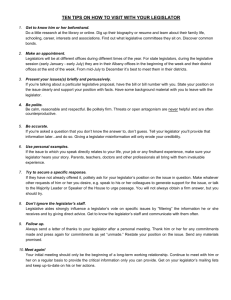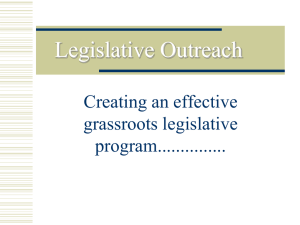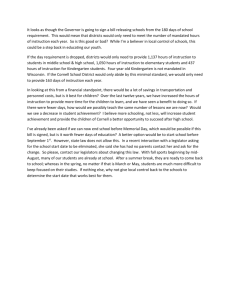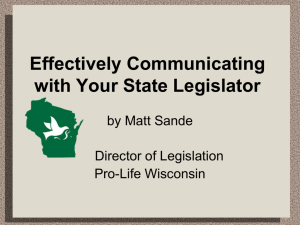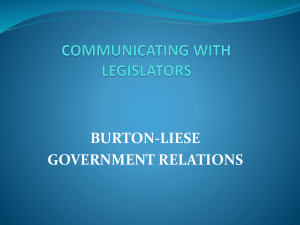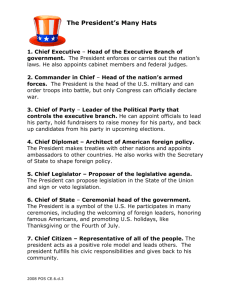GENERAL GUIDELINES FOR WRITING TO YOUR LAWMAKER
advertisement
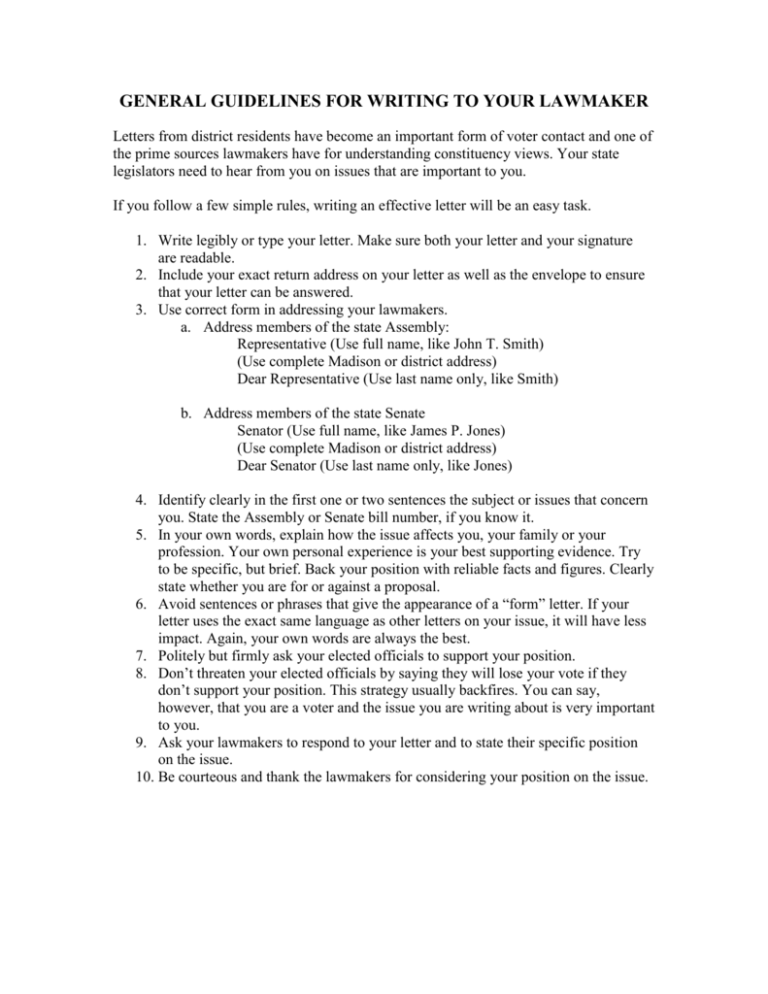
GENERAL GUIDELINES FOR WRITING TO YOUR LAWMAKER Letters from district residents have become an important form of voter contact and one of the prime sources lawmakers have for understanding constituency views. Your state legislators need to hear from you on issues that are important to you. If you follow a few simple rules, writing an effective letter will be an easy task. 1. Write legibly or type your letter. Make sure both your letter and your signature are readable. 2. Include your exact return address on your letter as well as the envelope to ensure that your letter can be answered. 3. Use correct form in addressing your lawmakers. a. Address members of the state Assembly: Representative (Use full name, like John T. Smith) (Use complete Madison or district address) Dear Representative (Use last name only, like Smith) b. Address members of the state Senate Senator (Use full name, like James P. Jones) (Use complete Madison or district address) Dear Senator (Use last name only, like Jones) 4. Identify clearly in the first one or two sentences the subject or issues that concern you. State the Assembly or Senate bill number, if you know it. 5. In your own words, explain how the issue affects you, your family or your profession. Your own personal experience is your best supporting evidence. Try to be specific, but brief. Back your position with reliable facts and figures. Clearly state whether you are for or against a proposal. 6. Avoid sentences or phrases that give the appearance of a “form” letter. If your letter uses the exact same language as other letters on your issue, it will have less impact. Again, your own words are always the best. 7. Politely but firmly ask your elected officials to support your position. 8. Don’t threaten your elected officials by saying they will lose your vote if they don’t support your position. This strategy usually backfires. You can say, however, that you are a voter and the issue you are writing about is very important to you. 9. Ask your lawmakers to respond to your letter and to state their specific position on the issue. 10. Be courteous and thank the lawmakers for considering your position on the issue. LEGISLATIVE TIPS 1. Get to know your legislators personally. If you are perceived as a loyal constituent, your views and opinions will have a more positive impact. 2. Contact your legislators on specific issues. a. Meet with them in the district. b. Write a personal letter or short note. c. Telephone them. 3. If you are representing the association: a. Understand the association's positions. If you are unclear about a position, obtain the correct information. b. Educate the legislators about your position. c. When you differ from the association’s position, make the difference clear to your legislator. d. Forward the legislator's concerns and views to the association leadership. 4. No legislator will agree with you 100% of the time. a. Try to understand the legislator's positions and votes on a full range of issues. b. Understand why the legislator will take a certain position or vote a certain way. c. Thank them for their support. d. Accept their decision politely when they do not support you. 5. No legislator has time to learn about every bill, law or regulation. a. Explain your concerns and views assuming that legislators have a limited understanding of the issue and little time to learn about it. b. Offer to provide them with additional information. Follow through on this offer. 6. Remember that legislators are busy. a. Make appointments to see them in the district or the Capitol. b. Be on time. c. Keep visits short - 15 minutes to a half hour is adequate. 7. Remember, you represent your industry. a. Stress future concerns and pertinent historical background. b. In discussing conflicting viewpoints, stress areas of agreement. 8. Prepare well for legislative hearings and meetings. a. Prepare a written text. Distribute copies to committee members. b. Be brief - 5 minutes should suffice. c. Address the proposals directly. d. Be prepared to answer questions. e. Be polite and courteous at hearings. 9. Know the opposing arguments - legislators need to know what the other side says. 10. Get to know key staff people. If you can't talk to the legislator, talk to an aide. SOME DOS AND DON’TS FOR MEETING WITH LEGISLATORS DO: Know whether the legislator is a member of a standing committee which will deliberate your issue. Make a special effort to speak to the chairman of the committee to ask for support in scheduling a hearing. DO: Identify yourself immediately and whether you are contacting the legislator on behalf of a specific group. DO: Show awareness of the status of your legislation. Know the co-sponsors and which committee holds the bill, if already introduced. If the bill has not yet been introduced, be able to tell legislators which of their colleagues is the main author and any other sponsors you know of. DO: Find out when committee hearings will be held and offer to give brief testimony before the committee (written testimony submitted to the committee chairman is just as acceptable). Be prepared to answer any questions as thoroughly as you can, and explain how the issue affects you (or your group) personally. DO: Leave the legislator a brief written copy of your points. It is an especially helpful reference for their bill files. DO: Be brief! If you can outline your position in five to ten minutes, you will have a much better chance of obtaining an appointment. Thank your legislator for his/her time and indicate a willingness to provide additional information if you can. DON’T: NEVER, EVER, EVER LIE! Don’t exaggerate to make your point, but give your legislator solid, accurate information. DON’T: Never threaten your legislator. “I’m a taxpayer, so do what I want or else” will likely earn you a negative vote. Everyone is a taxpayer (even legislators) and an earnest appeal with reliable facts will take you much farther. DON’T: Ignore your legislator’s staff. If the legislator is busy, take the time to outline your views to a staff member and request they transmit the information to the legislator. During legislative session, hundreds of people want access to the same 132 legislators, so play it smart and contact the staff member who can help you. DON’T: Argue with your legislator. If you are on opposite sides of an issue, calmly state your points and ask that they consider your point of view when they vote. Even if the votes are against you, your attitude may keep the lines of communication open for future issues. THINGS TO AVOID 1. Never address a legislator as Mr. or Ms. – always address them as Representative or Senator. 2. Never mix personal, political or partisan concerns with industry or association issues. Discuss personal issues on personal time. 3. Never threaten legislators with political reprisals. If you want to defeat a legislator, concentrate on the next election. 4. Never imply or demand that your political efforts or contributions buy a vote or legislative support – it is illegal and will backfire. 5. Never attempt to embarrass a legislator. It is in bad taste and will serve only to embarrass you and your interests. 6. Never “burn your bridges” with a legislator. You might not need them today but you will certainly need them tomorrow. 7. Never allow an association to become a voting block for partisan efforts. Allow equal time for both points of view. 8. Never misstate an association’s position on issues. Misstated positions will destroy the credibility of an association. If you disagree with the association’s position, do not represent your position as that of the association. 9. Never insist that a legislator vote for or support a proposal. “Request” is the proper word. 10. Never alienate a legislator’s staff or friends. They may aid in the decision process to support or oppose your position. 11. Never cry wolf: legislators hear wolves howling on most issues and you will lose credibility when you overreact. 12. Never argue with committee members at a public hearing. The time for persuasion is in a private meeting. 13. Never forget to say thank you. A letter of support and thanks after a vote will be long remembered.


